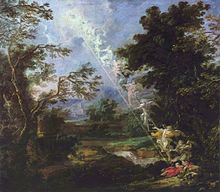| Part of a series of articles on |
| Psychoanalysis |
|---|
 |

Dream psychology is a scientific research field in psychology. In analytical psychology, as in psychoanalysis generally, dreams are "the royal road" to understanding unconscious content.[H 1]
However, for Swiss psychiatrist Carl Jung, its interpretation and function in the psyche differ from the Freudian perspective. Jung explains that "the general function of dreams is to try to re-establish our psychological equilibrium by means of dream material which, in a subtle way, reconstitutes the total equilibrium of our entire psyche. This is what [he] calls the complementary (or compensatory) function of dreams in our psychic constitution".[D 1] In this sense, dreams play a part in the development of the personality, at the same time as linking the subject to the vast imaginary reservoir that is the collective unconscious. According to analyst Thomas B. Kirsch, "Jung regards the dream as a natural and normal psychic phenomenon, which describes the dreamer's inner situation [and makes it a] spontaneous self-portrait, in symbolic form, of the present state of his unconscious".[H 2]
Jung and his followers, such as Marie Louise von Franz (for whom dreams are "the voice of human instinct")[1] and James Hillman, made a significant contribution to the science of dreams. Carl Gustav Jung proposed a dual reading of the dream in terms of object and subject, while representing the dream as a dramatic process with phases that shed light on its meaning, always individual but also reducible to cultural and universal issues. His method of interpretation, "amplification", allows us to compare dream messages with myths and cultural productions from all eras. Marie Louise von Franz has studied dream symbols, while James Hillman is more interested in what this other world represents for the dreamer.
As a nocturnal theater of symbols, dreams are for Jung a natural production of the unconscious,[D 2] as well as the locus of personality transformation and the path to what Jung calls "individuation". The dream is therefore at the heart of Jungian psychotherapy, which aims, through its study and the method of amplification, to relate each dream motif to the human imagination, and thus develop its meaning for the dreamer.
Cite error: There are <ref group=H> tags on this page, but the references will not show without a {{reflist|group=H}} template (see the help page).
Cite error: There are <ref group=D> tags on this page, but the references will not show without a {{reflist|group=D}} template (see the help page).
- ^ « Marie-Louise von Franz » : interview by Rolande Biès, 1978, reproduced on the site cgjung.net. Consulted in 2009.